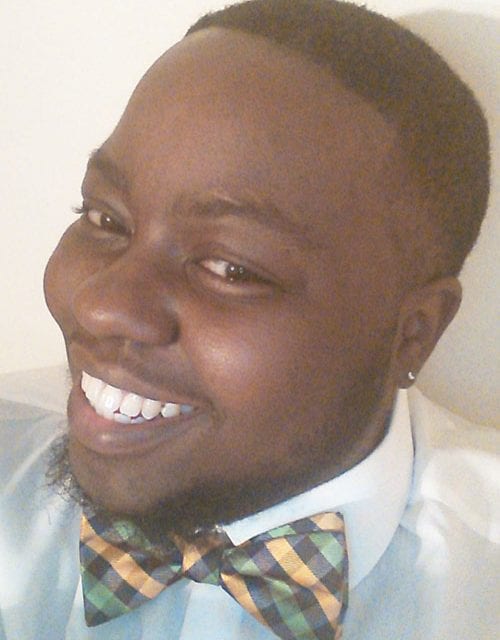Darrius Phillips hopes to be a role model for other young trans men

DAVID TAFFET | Senior Staff Writer
By the age of seven, even though assigned a female gender at birth, Darrius Phillips knew he was a boy.
But he had no one to talk to about his gender, which made it even more bewildering.
“I was raised in a Christian home, and I didn’t have the courage to tell my parents,” Phillips said. “It was something I kept to myself.”
But keeping his true gender to himself caused depression, Phillips said, because he didn’t know how to verbalize that he simply wasn’t a girl.
As a teenager, Phillips said, he was quiet and reserved and spent quite a bit of time around his mother. She noticed girls were attracted to him, which upset her. He said he always tended to dress in a more masculine manner, but tried to not to go so far that his mother would be upset.
What Phillips didn’t know when he was younger was that actually transitioning to male was possible. Especially for African-Americans, it was not common to have what he called something “cosmetic” done. In his community, he said, the idea of surgery was a joke.
As an adult, Phillips looked for information on the Internet, which led him to finally meet Carter Brown, founder of Black Transmen in Dallas.
“That’s when I began transitioning,” he said. He was 25 at the time.
In 2011, Phillips met with Felisha Porter, a counselor with an extensive practice dealing with gender identity.
“She gave me confidence to be myself,” he said. “She pushed me to live the way I wanted to live.”
His next step was beginning the physical transition. “I went to the Nelson-Tebedo Clinic to see a doctor who prescribed hormones,” Phillips said.
Beginning that transition — outwardly becoming the male that he had always been on the inside — had a high cost: “I couldn’t see my mom anymore,” he said. “When I went to visit, I wasn’t welcome there. She didn’t want me around.”
Earlier this year, Phillips underwent gender-confirming surgery.
When he was younger, the community of trans men was much less visible. Phillips hopes to help change that, making himself available to other trans men so they’re not alone in their journey.
While many trans men and women have problems at work, Phillips said he’s lucky to have not experienced that discrimination.
Currently, he works at a mental health hospital. Phillips hasn’t had his gender marker changed yet, but now that he’s had surgery, he plans to get that taken care of. When he began his current job last year, that could have presented a problem.
“When HR did my background work, it said female,” he said. “They asked about it.”
Phillips explained he was transgender and his HR department has kept that information confidential.
Although he said he has some qualms about being “stealth” at work, his coworkers know him only as male and that keeps his employment more secure.
In his previous position, he transitioned on the job. “I went through a phase where everyone used the wrong pronoun,” he said.
While that was uncomfortable, he said there weren’t instances of the misuse being malicious. But in his current position, he notices a respect he gets as a male that he didn’t get when others still thought of him as female, even after his transition.
For the future, Phillips would like to continue his education and become licensed professional counselor. He said there aren’t many black trans LPCs.
“I always felt more like an ally rather than a lesbian,” he said.
Phillips described transitioning as a process that can be scary and even surreal.
“We worry about jobs. We worry about hate crimes, he said, adding that after they first come out and test the waters, many trans people go back into their shell, like he did, for awhile. Because trans men often grow a beard and are not recognized as trans, he said many go stealth after transitioning, blending quietly into the mainstream.
But that doesn’t help young trans men looking for role models. Younger trans men need someone to step out and say, “I’m here,” and be a mentor, and Phillips said that’s a role he hopes to fill.
“People are afraid of what they don’t understand,” he said. “I’m here to show people it’s OK.”
He said he’s not out to trick anyone about who he is and he’s really someone just like anyone else.
“I’m just an average guy going to work everyday,” he said.
This article appeared in the Dallas Voice print edition June 26, 2015.


